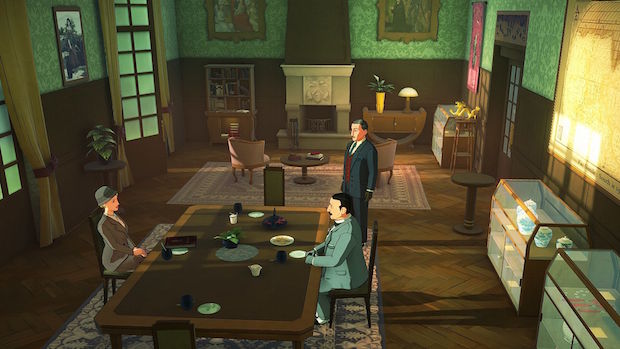The ABC Murders is an adventure and investigation game adapted from the classic Agatha Christie novel. Assume the role of the famous private detective Hercule Poirot and, once again, you find yourself up against a mysterious serial killer who goes by the name of “ABC”.
trailer:
Announced in 2015,this game is available now.You will have to explore many crime scenes in various cities set in beautiful surroundings across the United Kingdom. Leave no stone unturned when it comes to cross examinations and deadly puzzles! Observe, question and explore everything possible in order to make the smartest deductions and understand the murderer’s plans.
From the pages of Agatha Christie’s works comes arguably one of the greatest minds in criminal investigation, Hercule Poirot. Having starred in over thirty novels and over fifty short stories, it is little wonder that he should serve as the chief protagonist in which The ABC Murders takes place. Using Poirot’s keen mind (and sometimes even your own), you’ll examine crime scenes, question suspects, discover clues, and unravel the mystery itself.
If the idea of stepping into the shoes of the famed Belgian detective is a little intimidating, it shouldn’t be. The puzzles, ranging from figuring out secret codes, to manipulating objects are hardly challenging and for the most part, are pretty straightforward and can be completed without much trial and error. It’s nice that such puzzles aren’t overly challenging, in order to move the narrative along, but at the same time, they feel unworthy of the great investigator; sort of like donning the mantle of Sherlock Holmes and then attempting to figure out who stole the last loaf of bread from the kitchen, with a trail of breadcrumbs leading directly to the culprit.
Luckily, there are a number of things keeping you and Poirot busy in between solving puzzles. Examining crime scenes involves different “phases” where you walk around freely, and on points of interest you zoom in, and begin “observation” phases, where you attempt to notice several important details about the scene or object. You can go into observation mode on various suspects and other characters in the narrative, in an effort to determine their behavior, and/or if they’re being truthful, or hiding something.
The “thinking” phase begins when you examine an object that you can manipulate, such as a small desk clock with a false bottom that can be slid away, or a combination lock that you can rotate the dials on. Finding tangible clues or evidence in this phase often leads to the “little grey cells” phase where you go over all the clues and evidence you’ve recently collected, and attempt to make sense of it by associating the important pieces of evidence with specific questions pertaining to the specific crimes, such as time of death, or motive for the killing, etc. This is one of the nice touches from the novels, in which Poirot often refers to his “little grey cells” as his brain.
At the end of each case, you’ll enter a “reconstruction” phase, where you attempt to reconstruct the crime, based on the clues and evidence you’ve collected so far. The crime plays out in muted sepia tones and you select from a few different options at certain points, based on the facts you’ve collected. If you fail to choose the correct option at any of these points, you’ll have to start the scene over,
The three cases are all interconnected and you’ll also find overlapping evidence, or clues present from one investigation that will appear in the next. If you get stuck on a puzzle or just not sure where to go or exactly what to do next, there’s a handy “use a clue” button that will solve whatever puzzle you’re currently working on or point you in the right direction if you’re totally lost, however it has a cooldown of about one hundred seconds; also it won’t completely solve every puzzle for you, some things you’ll simply have to work out for yourself.
As Poirot, you’re more than well equipped to solve any mystery, but you also have several companions who provide narrative context, as well as differing perspectives on the cases and evidence. There’s Poirot’s trusty sidekick, Captain Arthur Hastings, who Poirot describes at one point as “entirely too optimistic,” and the always overworked and stodgy Chief Inspector Japp.
You also acquire “ego points” for behaving in a manner consistent with Poirot himself, earning a greater number of points for your skill at Poirot-city, if you will. Sadly, you can’t spend these ego points on fashionable new outfits for Poirot, however if you act decidedly un-Poirot, such as grilling a suspect too hard, you’ll be hilariously chastised by Hastings, along the lines of, “Why Poirot, I’ve never known you to be so brutal!” Priceless.
- developer:Microids , Artefacts Studios
- publisher:Gravity Europe SAS
- date of release:04.february 2016,

Your Comment Here